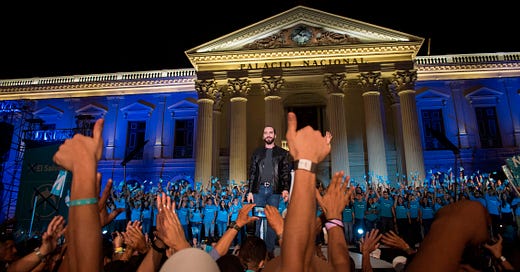
El Salvador’s Dictator Is a Darling of the American Right. He Shouldn’t Be.
Untroubled by Nayib Bukele’s dismantling of democracy, they praise him for his toughness.

EL SALVADOR’S PRESIDENT, Nayib Bukele, is running for re-election, and with a (supposed) 90 percent approval rating, he’s overwhelmingly favored to win. He calls himself a “Philosopher King” and the “world’s coolest dictator” on Twitter. Whether he’s “cool” is a matter of opinion; that he’s a dictator is a fact.
Bukele has created one of the toughest security states in the world. To solve El Salvador’s decades-long security crisis that has left hundreds of thousands dead since 1980 and created a lucrative illicit economy, Bukele put more than 70,000 people (more than 1 percent of the country’s total population) in overcrowded, maximum-security prisons without trial. He just finished building a mega-prison that can hold up to 100 detainees per cell.
To accomplish his feats of incarceration, Bukele extended the security powers of the state, as well as the powers of his own office. He replaced judicial officials en masse with new ones loyal to him, who in turn ensured he could run for re-election in 2024, which the previous Supreme Court had ruled unconstitutional.
According to Amnesty International, Bukele has personally intimidated journalists, human rights defenders, and judicial officials looking to report on the mass incarceration by accusing them of having gang connections, without evidence. It’s enough to make one wonder how many of those 70,000 people were really criminals.
Yet, for these hardline measures, Bukele has attracted the favorable attention of conservative pundits in the United States.
The Daily Wire’s Michael Knowles praised the wannabe dictator: “He’s ‘authoritarian’? He’s wielding authority to do good, to get the bad guys and help the good guys. We should be doing that too.”
The New York Young Republican Club endorsed Bukele on Twitter, wishing, “May our own 2024 election bring us an American Bukele!”
Tucker Carlson conducted a softball interview with Bukele, praising his handling of the country for an hour and calling him the most selfless politician he’s ever met. (They apparently had a five-hour dinner the night before. How romantic.)
Senator Marco Rubio, who prides himself on defending democracy and liberal values, met Bukele in San Salvador. In the meeting, Rubio praised Bukele for being a “democratic leader,” while calling on the United States to have closer ties with the dictator.
All these expressions of warm feelings toward Bukele are disturbing enough as another example of the American right’s love of dictators and abusers of human rights. But it’s additionally troubling because the claims that Bukele makes about his government’s successes don’t stand up to scrutiny.
His anti-crime crusade, for example, is a crock. Bukele cites plummeting crime rates in defense of his “mano dura” (hard hand) policy, but his numbers are wrong. Investigative journalists and human-rights groups have conducted their own surveys, leading them to conclude that the impact of his policies on the security problem is only minor and that the homicide rate has not dropped by much. Instead, the drop in violent crime is more likely the consequence of secret ceasefire deals that Bukele and his government allegedly signed with leading drug gangs.
Bukele, in this case, would not be the first Latin American leader to tout his hardline security policy’s success while signing deals with cartels behind closed doors to keep the peace. At least one such leader, former Mexican Secretary of Public Security Genaro García Luna, went to prison.
Even if Bukele’s statistics were true and his “mano dura” policy was working, he would still be dangerous. Bukele is an autocrat with a thirst for power using the security crisis to make his power grab seem legitimate. Changing the constitution, judicial system, and criminal justice system to fit security circumstances creates a dangerous precedent for future governments. Rather than restoring the rule of law, Bukele has created what amounts to the strongest gang, which happens to fly the flag of El Salvador and wear uniforms.
El Salvador had a legitimate problem with violent, organized crime and corruption for decades. If that problem is receding, it’s only because it’s being replaced by what looks increasingly like political terror.
THERE ARE BETTER WAYS to fight drug cartels than by creating dictatorships. Drug decriminalization, legalization, and harm-reduction programs helped reduce gang activity in Bolivia and Chile. A demilitarized approach has also been successful in Belize, Costa Rica, and Panama, which continue to have comparatively low violent crime rates while focusing on interdiction through multilateral support, targeting the drug supply, and focusing on leaders rather than on combat with low-level gang members.
The Colombian government’s 2016 peace deal with its long-running insurgency, the FARC, has proved partially successful. It hasn’t eliminated rural violence, especially because some hardline factions of the guerrilla movement refused to make peace. And it hasn’t resolved the thorny political, economic, and social issues that inevitably follow insurgencies and civil wars. But it has reduced the level of violence and helped stabilize the country. Giving other gangs a chance to “go legit” might be worth a shot.
Building a safer society should strengthen El Salvador’s constitutional republic, not to mention our own. A strong, stable, vibrant El Salvador would help alleviate both America’s illicit drug problem and the chronic problems with migration across the Southern border.
Bukele portrays himself as having found the magic bullet to solve Central America’s problems. In reality, he’s only adding to the lawlessness that created those problems in the first place. American conservatives—if they really care, as they claim to, about government overreach and maintaining law and order—should recognize Bukele for what he is.
















